Method Overloading
Java allows method overloading, where two or more methods of the same class can share the same name.
Method overloading occurs when method parameter declarations are different.
Method overloading is a way of implementing polymorphism in Java.
To overload a method, you need to declare different versions of it.
The compiler automatically selects the correct method based on the parameters.
An important restriction: overloaded methods must differ in the type and/or number of parameters, not just the return type.
Overloaded methods can also differ in their return types, but the parameters are essential for choosing the correct method.
When an overloaded method is called, the version with parameters that match the arguments is executed.
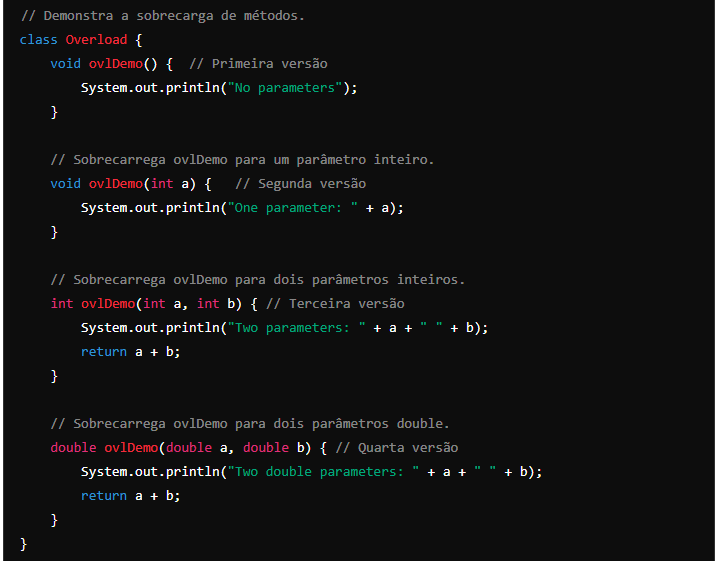
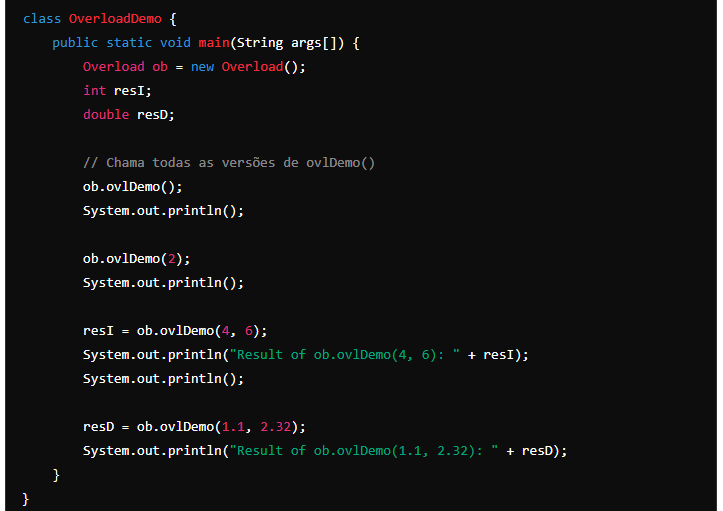
The ovlDemo() method is overloaded four times with different signatures:
First version: without parameters.
Second version: with an integer parameter.
Third version: with two integer parameters.
Fourth version: with two double parameters.
The first two versions of ovlDemo() return void, while the last two return a value.
Method overloading is not affected by return type.
Attempts to use both versions of ovlDemo() with signatures only differentiated by return type will cause an error.
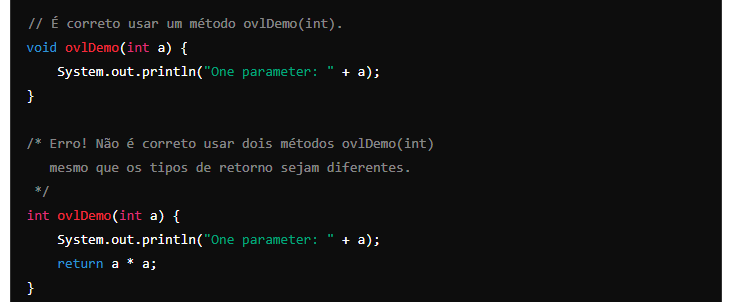
The difference in return types is not enough for method overloading in Java.
The example shows that two methods with the same signature, even with different return types, cause an error.
Java performs automatic type conversions, and these conversions also apply to parameters of overloaded methods.
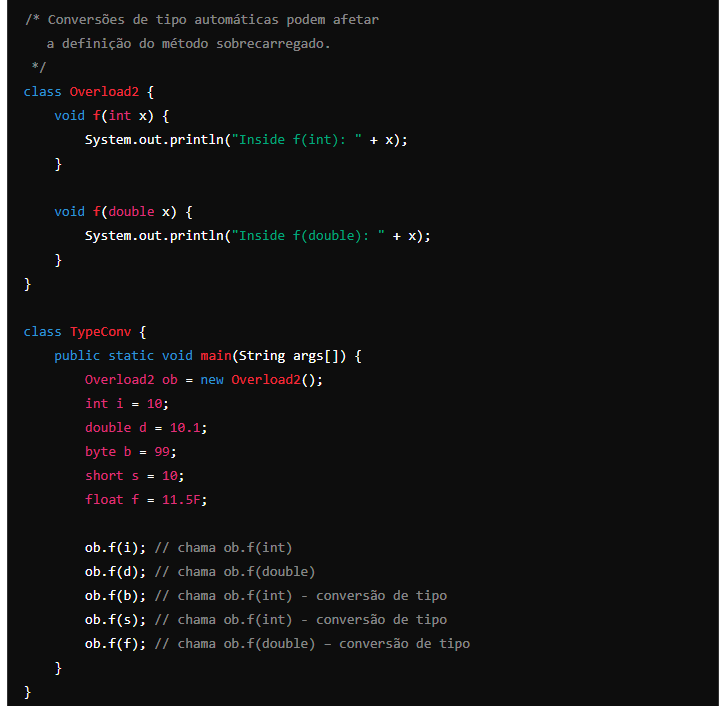
The example shows two versions of the f() method: one with an int parameter and the other with a double parameter.
Values of types byte and short are automatically converted to int, calling the f(int) method.
Float values are converted to double by calling the f(double) method.
Automatic conversions occur when there is no direct match between a parameter and an argument.
Adding a version of f() with a byte parameter can change the way values are handled.
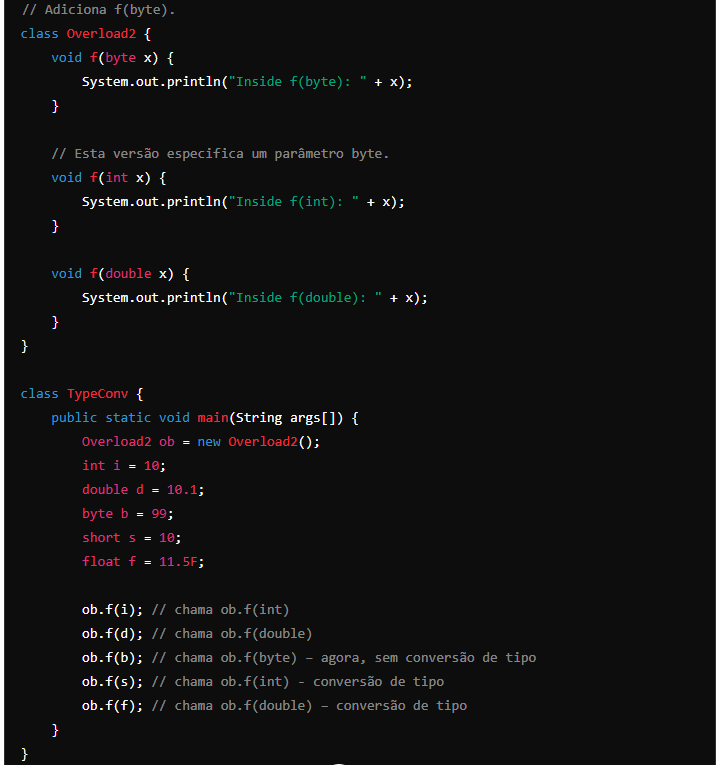
With the current version, when f() is called with a byte argument, f(byte) is called directly, without automatic conversion to int.
Method overloading allows polymorphism in Java, facilitating the implementation of the “one interface, many methods” paradigm.
In languages without overloading support, similar methods for different data types need to have different names (e.g. abs(), labs(), fabs() in C).
Java allows you to use the same name for methods with different types of arguments, such as the abs() method of the Math class, which is overloaded for different numeric types.
Overloading reduces complexity by allowing related methods to share a common name.
The selection of the correct version of the method is done by the compiler based on the argument type.
Although overloaded methods can perform different activities, they must be related to maintain clarity and coherence.
Avoid using overloaded method names for unrelated operations, as this may confuse the intent of the code.
The above is the detailed content of Method Overloading. For more information, please follow other related articles on the PHP Chinese website!

Hot AI Tools

Undresser.AI Undress
AI-powered app for creating realistic nude photos

AI Clothes Remover
Online AI tool for removing clothes from photos.

Undress AI Tool
Undress images for free

Clothoff.io
AI clothes remover

Video Face Swap
Swap faces in any video effortlessly with our completely free AI face swap tool!

Hot Article

Hot Tools

Notepad++7.3.1
Easy-to-use and free code editor

SublimeText3 Chinese version
Chinese version, very easy to use

Zend Studio 13.0.1
Powerful PHP integrated development environment

Dreamweaver CS6
Visual web development tools

SublimeText3 Mac version
God-level code editing software (SublimeText3)

Hot Topics
 1664
1664
 14
14
 1423
1423
 52
52
 1317
1317
 25
25
 1268
1268
 29
29
 1246
1246
 24
24
 Is the company's security software causing the application to fail to run? How to troubleshoot and solve it?
Apr 19, 2025 pm 04:51 PM
Is the company's security software causing the application to fail to run? How to troubleshoot and solve it?
Apr 19, 2025 pm 04:51 PM
Troubleshooting and solutions to the company's security software that causes some applications to not function properly. Many companies will deploy security software in order to ensure internal network security. ...
 How do I convert names to numbers to implement sorting and maintain consistency in groups?
Apr 19, 2025 pm 11:30 PM
How do I convert names to numbers to implement sorting and maintain consistency in groups?
Apr 19, 2025 pm 11:30 PM
Solutions to convert names to numbers to implement sorting In many application scenarios, users may need to sort in groups, especially in one...
 How to simplify field mapping issues in system docking using MapStruct?
Apr 19, 2025 pm 06:21 PM
How to simplify field mapping issues in system docking using MapStruct?
Apr 19, 2025 pm 06:21 PM
Field mapping processing in system docking often encounters a difficult problem when performing system docking: how to effectively map the interface fields of system A...
 How does IntelliJ IDEA identify the port number of a Spring Boot project without outputting a log?
Apr 19, 2025 pm 11:45 PM
How does IntelliJ IDEA identify the port number of a Spring Boot project without outputting a log?
Apr 19, 2025 pm 11:45 PM
Start Spring using IntelliJIDEAUltimate version...
 How to elegantly obtain entity class variable names to build database query conditions?
Apr 19, 2025 pm 11:42 PM
How to elegantly obtain entity class variable names to build database query conditions?
Apr 19, 2025 pm 11:42 PM
When using MyBatis-Plus or other ORM frameworks for database operations, it is often necessary to construct query conditions based on the attribute name of the entity class. If you manually every time...
 How to safely convert Java objects to arrays?
Apr 19, 2025 pm 11:33 PM
How to safely convert Java objects to arrays?
Apr 19, 2025 pm 11:33 PM
Conversion of Java Objects and Arrays: In-depth discussion of the risks and correct methods of cast type conversion Many Java beginners will encounter the conversion of an object into an array...
 E-commerce platform SKU and SPU database design: How to take into account both user-defined attributes and attributeless products?
Apr 19, 2025 pm 11:27 PM
E-commerce platform SKU and SPU database design: How to take into account both user-defined attributes and attributeless products?
Apr 19, 2025 pm 11:27 PM
Detailed explanation of the design of SKU and SPU tables on e-commerce platforms This article will discuss the database design issues of SKU and SPU in e-commerce platforms, especially how to deal with user-defined sales...
 How to use the Redis cache solution to efficiently realize the requirements of product ranking list?
Apr 19, 2025 pm 11:36 PM
How to use the Redis cache solution to efficiently realize the requirements of product ranking list?
Apr 19, 2025 pm 11:36 PM
How does the Redis caching solution realize the requirements of product ranking list? During the development process, we often need to deal with the requirements of rankings, such as displaying a...




